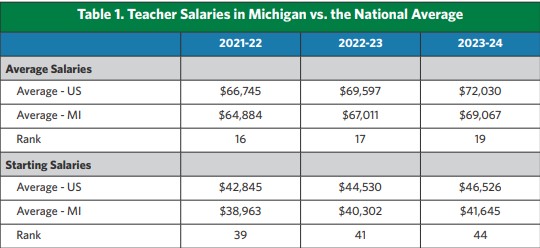Michigan teacher pay ranks near the bottom for starting salaries, with strong public support for raises and increased K-12 funding, an MSU report finds.
Michigan teacher pay ranking drops to 44th as public backs raises, more state funding

LANSING — Michigan’s teacher salaries are falling further behind national averages, a new report from Michigan State University’s Education Policy Innovation Collaborative (EPIC) shows, raising concerns about the state’s ability to recruit and keep qualified educators.
The Teacher Compensation in Michigan: Recent Trends and Public Opinion, 2025 Update finds that Michigan now ranks 44th nationally in average starting teacher pay, dropping five spots since the 2021–22 school year. New teachers in Michigan earn about $41,600 annually — nearly $4,900 below the U.S. average — while the state’s overall average salary of $69,100 ranks 19th, roughly $3,000 less than the national figure.
The wage gap between teachers and similarly educated professionals is also widening. Michigan teachers now earn nearly 23% less than comparable workers in other fields. This “teacher pay penalty,” researchers warn, could exacerbate existing staffing shortages and harm student learning.
Michigan’s slipping salary rankings fueled by other states’ aggressive pay hikes
While Michigan has enacted few statewide salary initiatives in recent years, many states have passed significant raises. Over the past two school years, Mississippi, Arkansas, Georgia, North Carolina, South Carolina, and West Virginia have all leapfrogged Michigan in starting pay rankings. Nearly half of states increased starting salaries by more than 10% during the same period, compared to Michigan’s 6.9% growth.
Lead author Jason Burns, an EPIC research specialist, said low pay is a barrier to attracting and retaining high-quality teachers. “Without stronger compensation, Michigan risks prolonging its current teacher shortages, which will negatively impact student achievement,” Burns said.
Public wants significant raises, favors more state funding over cuts
The report incorporates data from the Spring 2025 State of the State Survey of 1,000 Michigan adults, revealing a strong public appetite for change. Respondents said starting teachers should earn about $54,600 — roughly $13,000 more than the current average — and that average salaries should rise by $2,400 to approximately $71,400.
Three-quarters of those surveyed support increasing starting salaries, while nearly half favor boosting average salaries. Public backing extends to targeted measures, with over 75% supporting incentives for teachers in hard-to-staff schools or subjects.
When asked about funding strategies, 56% supported shifting money from non-educational state spending to teacher pay. Fewer than one in five supported cutting existing programs or increasing class sizes. Only about one-quarter backed tax increases, though researchers noted that public opinion could shift if the benefits of higher teacher pay are clearly explained.
Funding options center on Lansing’s role in K-12 financing
Because Michigan’s K-12 operating budgets depend largely on state appropriations, solutions will have to come from Lansing. EPIC outlines three possible approaches:
• Redirecting funds from non-education programs with lower public support
• Restoring the level of General Fund transfers to K-12 education seen in the 1990s and early 2000s
• Building political support for new revenue sources to sustain pay increases
Report co-author Madeline Mavrogordato, EPIC director and MSU College of Education professor, said lawmakers have a rare opportunity to act. “The public has outlined a clear roadmap, and state leaders should take note. Increasing K-12 funding for teacher salaries could strengthen the educator workforce and ultimately improve educational outcomes,” she said.
Broader economic stakes tied to improving teacher pay
Research cited in the report links competitive teacher salaries to lower turnover, higher student achievement, and long-term economic growth. Teachers are the most important in-school factor in student performance, and better-educated graduates contribute to a stronger workforce and larger tax base.
“Competitive salaries remain one of the few levers that can simultaneously ease staffing shortages, raise student outcomes, and strengthen Michigan’s long-term prosperity,” the report concludes.
The question now is whether Michigan lawmakers will follow public sentiment — and the lead of other states — in making teacher pay a priority in the upcoming budget.
Related news
- Michigan Feature News Stories – Unveiling the diverse and vibrant people, captivating places, and remarkable events that come together to make the Great Lake State unique.
- Strange Political News – A sarcastic take on official news from around the U.S., exploring the absurdities that often arise in the political landscape while providing a humorous perspective on current events and highlighting the quirks of politicians and policies.
- Michigan Hometown News – News and events from Michigan’s Upper Thumb region worth knowing, including local stories, impactful interviews, and updates on community happenings that shape the culture and lifestyle of the area.
Your Turn – Like This, or Hate it – We Want To Hear From You
Please offer an insightful and thoughtful comment. We review each response. Follow us to have other feature stories fill up your email box, or check us out at ThumbWind News




